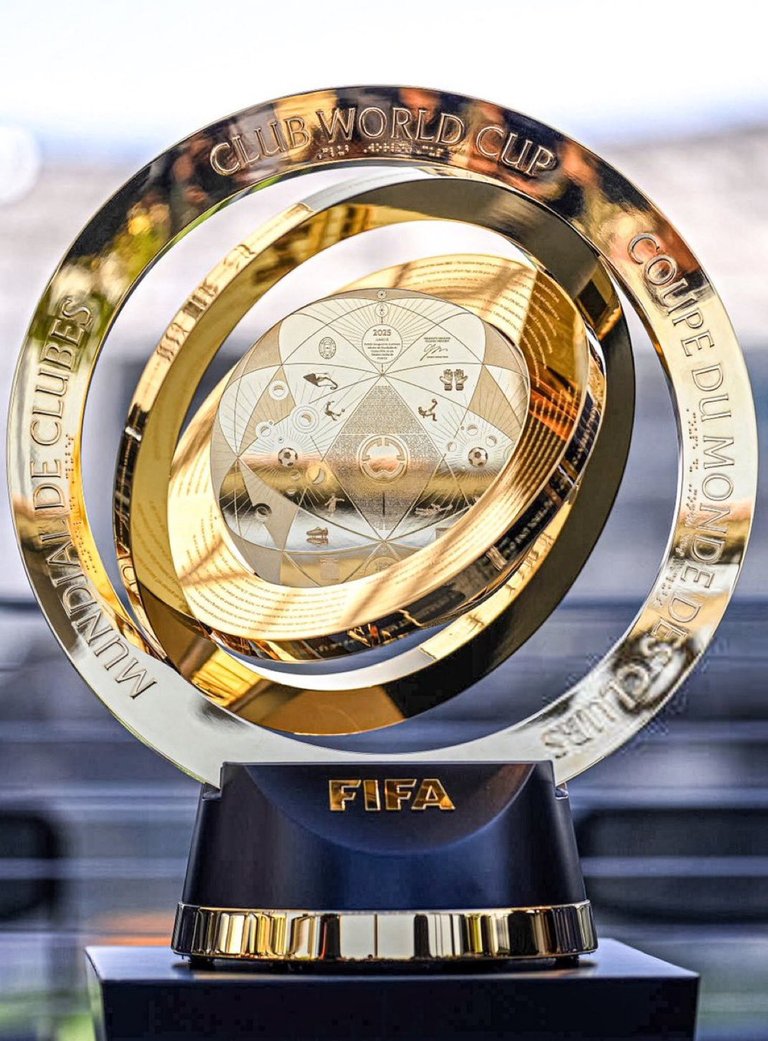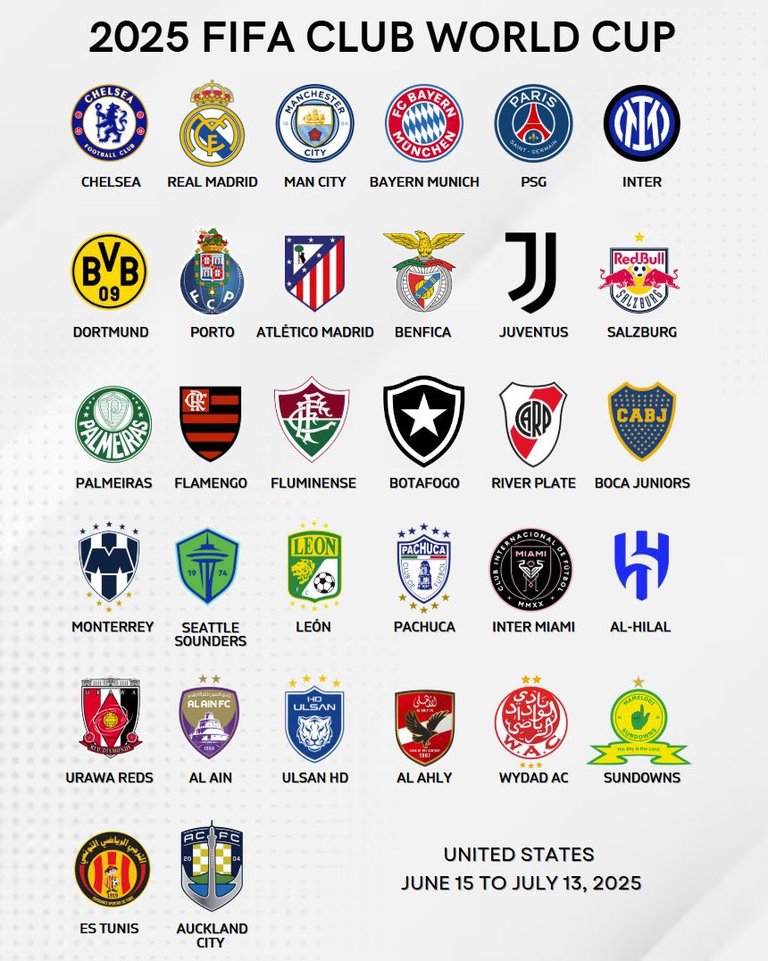Dominio sudamericano (SPA-ENG)

Imagen diseñada con asistencia de ChatGPT
El mundial de clubes de fútbol que se está disputando en los Estados Unidos de América en estos momentos incluye 32 equipos de todo el mundo y en la mayoría de ellos hay jugadores de diferentes nacionalidades; en total 998 jugadores están inscriptos por esos equipos con la posibilidad de ver acción al menos unos minutos.
Las estadísticas se basan en números históricos, cálculos que se efectúan sobre ellos y sirven para indicar generalmente alguna tendencia respecto a un hecho futuro, a un evento a determinar, a un resultado posible; pero cuando se basa en datos exactos solo con el fin de mostrar información confirmada y sin ánimo de explorar posibilidades o predecir el futuro, no dejan lugar para especulaciones ni discusiones de ningún tipo.
En ese sentido, me he puesto a investigar sobre las nacionalidades de los jugadores que integran esos 32 equipos y la cuenta final no deja lugar a dudas, los brasileños son mayoría, 141 jugadores de ese extraordinario país futbolístico de Sudamérica que exhibe 5 campeonatos mundiales en sus vitrinas, ese número da que el 14,13% del total de inscriptos son originarios de ese país.

Lo sigue Argentina con 103 jugadores y el 10,32%, bastante más atrás, en tercer lugar está España con 54, el 5,41% del total de inscriptos. Luego están Francia con 37 y un empate entre Alemania e Italia con 36, Inglaterra 25 y Uruguay 10, elegí esos países por haber sido al menos en una ocasión campeones mundiales.
En el total Sudamérica y Europa se reparte la gran mayoría de los jugadores, más de 300 en cada uno de ellos, luego Norte y Centroamérica superan los 100 al igual que Africa, Asia y Oceanía se reparten los restantes para llegar a la cifra de 998.
Casi como una confirmación numérica del dominio de Sudamérica y Europa sobre el resto del mundo futbolístico y de Brasil y Argentina por sobre cualquier otra nacionalidad. De hecho, podríamos ahondar un poco más en esos números y el caso de Argentina es destacable porque con tan solo 1/4 de habitantes de los que posee Brasil, tiene una "densidad" de jugadores aportados muy superior, pero esto ya comienza a complejizarse y entramos en el ámbito de las especulaciones, tómenlo solo como un dato y si les sirve bien, sino olvídense de ello.

Lo cierto y concreto es que por alguna causa que está fuera de este pequeño estudio, los que vivimos de este lado del mundo tenemos motivos para sospechar que el mejor fútbol del planeta se juega aquí, en este subcontinente.
Ahora bien, los equipos que mejor juegan son los europeos y eso es debido a que se llevan los mejores exponentes de nuestras canteras futbolísticas, por supuesto hacen una combinación con otros de diversas nacionalidades y locaciones, algún local siempre está incluido, al menos por resguardar las apariencias. Salvando las distancias es parecido a lo que ocurre con las grandes compañías de software del mundo, continúan creciendo e innovando porque compran todo aquello que les puede hacer sombra.

A menos que ocurra un milagro inesperado, es muy probable que veamos consagrarse como campeón mundial de clubes a un equipo europeo, antes de admirarlo y ensalzarlo, pensemos que una parte de ese trofeo nos pertenece.
South American dominance
The Club World Cup, currently being played in the United States of America, includes 32 teams from around the world, and most of them feature players of different nationalities. A total of 998 players are registered with these teams, with the possibility of seeing at least a few minutes of action.
Statistics are based on historical numbers, calculations made on them, and generally serve to indicate a trend regarding a future event, an event to be determined, or a possible outcome however, when they are based on exact data solely to show confirmed information and without the intention of exploring possibilities or predicting the future, they leave no room for speculation or discussion of any kind.
In that sense, I have begun to investigate the nationalities of the players who make up those 32 teams, and the final tally leaves no room for doubt: Brazilians are the majority, with 141 players from that extraordinary South American football country that boasts five world championships. This number means that 14.13% of the total number of registered players are originally from that country.
Argentina follows with 103 players, representing 10.32%, considerably behind. In third place is Spain with 54, 5.41% of the total registered players. Next comes France with 37, and a tie between Germany and Italy with 36, England with 25, and Uruguay with 10. I chose these countries because they have been world champions at least once.
In total, South America and Europe share the vast majority of the players, more than 300 each. Then, North and Central America exceed 100, while Africa, Asia, and Oceania share the remaining players, reaching a total of 998.
Almost like a numerical confirmation of the dominance of South America and Europe over the rest of the world in football, and of Brazil and Argentina over any other nationality. We could delve a little deeper into those numbers, and Argentina's case is notable because, with only a quarter of the population of Brazil, it has a much higher "density" of players. But this is already starting to get complex, and we're entering the realm of speculation. Take it as just a fact, and if it serves you well, forget it.
The truth and concrete fact is that, for some reason beyond this small study, those of us who live on this side of the world have reason to suspect that the best football on the planet is played here, on this subcontinent.
Now, the teams that play the best are the European ones, and that's because they take the best exponents from our youth teams. Of course, they combine teams with others of various nationalities and locations. A local team is always included, at least to save face. All things considered, it's similar to what happens with the world's largest software companies: they continue to grow and innovate because they buy anything that might overshadow them.
Unless an unexpected miracle occurs, we'll likely see a European team crowned world club champion. Before admiring and praising them, we'll consider that part of that trophy belongs to us.
Héctor Gugliermo
@hosgug